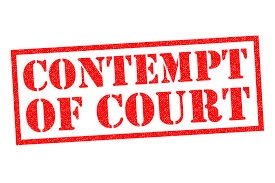

5
Feb
Avoiding Contempt of Court in Family Law: A Guide to Navigating Family Court Proceedings
Family court proceedings can be complex and emotionally charged, often involving sensitive issues such as divorce, child custody, and support arrangements. It's essential for individuals involved in family court matters to understand their rights and responsibilities to avoid potential contempt charges. In this blog post, we'll explore what contempt of court means in the context of family law and provide practical tips for avoiding this serious consequence.
Understanding Contempt of Court in Family Law: Contempt of court refers to any willful disobedience or disregard for the authority of the court, which can result in penalties such as fines, sanctions, or even imprisonment. In the realm of family law, contempt can arise from various actions or behaviors that violate court orders or disrupt the legal process, including:
- Failure to Comply with Court Orders: This includes failing to pay child support or alimony, refusing to adhere to visitation schedules, or disregarding other directives issued by the court regarding custody, property division, or spousal support.
- Interference with Parenting Time: Intentionally interfering with the other parent's court-ordered parenting time, whether by withholding visitation rights, refusing to return the child after visitation, or engaging in activities that undermine the parent-child relationship.
- Violating Restraining Orders or Protective Orders: Violating restraining orders or protective orders issued by the court to prevent harassment, domestic violence, or other forms of abuse against family members.
Practical Tips for Avoiding Contempt of Court:
- Compliance with Court Orders: It's crucial to comply fully and promptly with all court orders, including those related to child support, visitation, property division, and any other directives issued by the court. Failure to comply can lead to contempt charges and potential legal consequences.
- Clear Communication: Maintain open and respectful communication with your ex-partner or co-parent regarding any issues or concerns related to court orders. If circumstances change or if you encounter difficulties in complying with a court order, seek legal advice and request modifications through the appropriate legal channels rather than taking matters into your own hands.
- Documentation and Evidence: Keep detailed records of all communications, court orders, payments, and interactions related to your family court case. Documentation can serve as crucial evidence in demonstrating your compliance with court orders or defending against false accusations of contempt.
- Seek Legal Guidance: If you're unsure about your rights or obligations under a court order, or if you're facing challenges in complying with court directives, seek guidance from a qualified family law attorney. An experienced attorney can provide valuable advice, advocate on your behalf in court, and help you navigate complex legal proceedings effectively.
Avoiding contempt of court in family law matters requires a proactive and responsible approach to compliance with court orders, clear communication, documentation, and seeking legal guidance when needed. By understanding the implications of contempt charges and taking appropriate steps to comply with court directives, individuals involved in family court proceedings can minimize legal risks and ensure the best possible outcomes for themselves and their families.
To schedule a consultation with an experienced family law attorney at Tom Bush Law Group, please call us at 704-347-0110.




